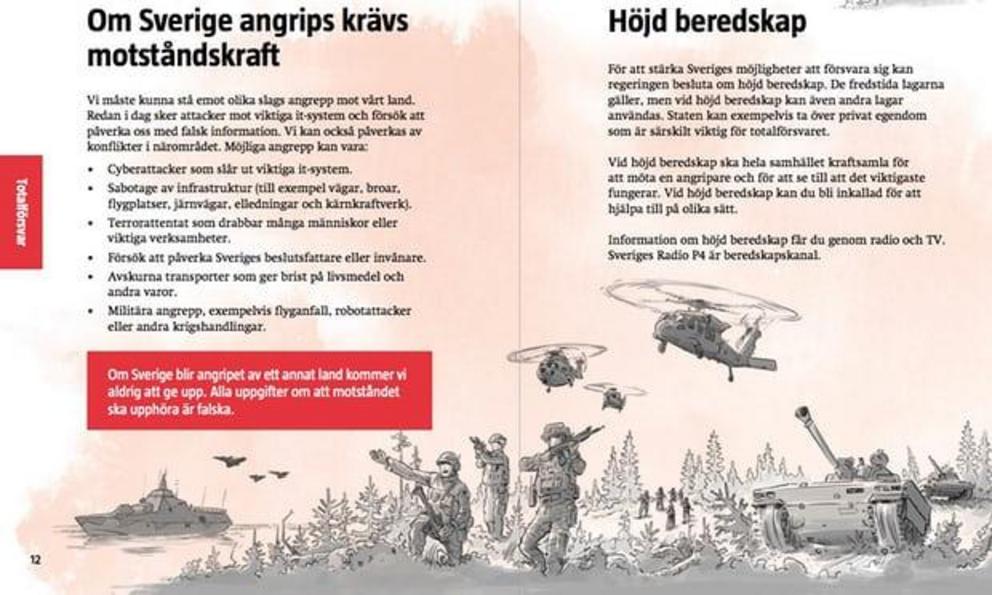Sweden distributes 'be prepared for war' leaflet to all 4.8m homes
Defence pamphlet shows how population can prepare in event of attack and contribute to country’s ‘total defence’
The Swedish government has begun sending all 4.8m of the country’s households a public information leaflet telling the population, for the first time in more than half a century, what to do in the event of a war.
Om krisen eller kriget kommer (If crisis or war comes) explains how people can secure basic needs such as food, water and heat, what warning signals mean, where to find bomb shelters and how to contribute to Sweden’s “total defence”.
The 20-page pamphlet, illustrated with pictures of sirens, warplanes and families fleeing their homes, also prepares the population for dangers such as cyber and terror attacks and climate change, and includes a page on identifying fake news.
“Although Sweden is safer than many other countries, there are still threats to our security and independence,” the brochure says. “If you are prepared, you are contributing to improving the ability of the country to cope with a major strain.”
Similar leaflets were first distributed in neutral Sweden in 1943, at the height of the second world war. Updates were issued regularly to the general public until 1961, and then to local and national government officials until 1991.
“Society is vulnerable, so we need to prepare ourselves as individuals,” said Dan Eliasson of the Swedish civil contingencies agency, which is in charge of the project. “There’s also an information deficit in terms of concrete advice, which we aim to provide.”
A Swedish cold-war era defence leaflet. Photograph: Försvarsmakten
The publication comes as the debate on security – and the possibility of joining Nato – has intensified in Sweden in the wake of Russia’s annexation of Crimea in 2014 and recent incursions into Swedish airspace and territorial waters by Russian planes and submarines.
The country has begun reversing military spending cuts and last year staged its biggest military exercises in nearly a quarter of a century, as well as voting to reintroduce conscription and unveiling joint plans with Denmark to counter Russian cyber-attacks and disinformation.
The leaflet advises people to think about how to cope if there was no heating, food became difficult to buy, prepare and store, there was no water in the taps or toilet, and cash machines, mobile phones and the internet stopped working.
It advises checking the source of all information, warning that “states and organisations are already trying to influence our values and how we act ... and reduce reduce our resilience and willingness to defend ourselves”.
A detailed page of “home preparedness tips” advises the population to stock up on water bottles, warm clothing and sleeping bags, and “non-perishable food that can be prepared quickly, requires little water or can be eaten without preparation”.
In the event of armed conflict, it says, “everyone is obliged to contribute and everyone is needed” for Sweden’s “total defence”: anyone between 16 and 70 “can be called to assist in the event of the threat of war and war”.
Sweden has not been at war with another country for more than 200 years. If it is attacked, the leaflet says, “we will never give up. All information to the effect that resistance is to cease is false.”

